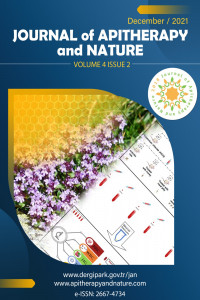Abstract
The Black Sea region belongs to one of the richest regions of Turkey regarding biological diversity. Totally 2239 species are distributed in the East Black Sea region. 514 species are endemic and the endemism ratio is ca. 23 %. Rize displays more than half of the plants distributed at the East Black Sea region. It can be stated that almost 70 % of these plants are of medicinal and aromatic value. One of them is Anzer Thyme. Totally 24 volatile oil components were detected corresponding to 99.88 % of total volatile oil. The biggest chemical group was oxygenated monoterpenes (77.83 %). Specially thymol, carvacrol and linalool were detected in high amounts (respectively 20.45 %, 14.83 % and 13.89 %).
Keywords
References
- Ghasemi Pirbalouti, A., Hashemi, M. & Ghahfarokhi, F.T. (2013). Essential oil and chemical compositions of wild and cultivated Thymus daenensis Celak and Thymus vulgaris L. Industrial Crops and Products, 48, 43–48. https://doi.org/10.1016/j.indcrop.2013.04.004.
- Toncer, O., Karaman, S. & Diraz, E. (2010). An annual variation in essential oil composition of Origanum syriacum from Southeast Anatolia of Turkey. Journal of Medicinal Plants Research, 4(11): 1059-1064. https://doi.org/10.5897/JMPR09.514. Kahya, E. (2017). El-Kanun Fi't-Tıbb. (2.th ed.). Atatürk Culture Center, Ankara.
- Lukas, B., Schmiderer & C. Novak, J. (2015). Essential oil diversity of European Origanum vulgare L. (Lamiaceae). Phytochemistry, 119, 32-40. https://doi.org/10.1016/j.phytochem.2015.09.008.
- Manou, I., Bouillard, L., Devleeschouwer, M.J. & Barel AO (1998). Evaluation of the preservative properties of Thymus vulgaris essential oil in topically applied formulations under a challenge test. Journal of Applied Microbiology, 84, 368–376. https://doi.org/10.1046/j.1365-2672.1998.00353.x.
- Tohidi, B., Rahimmalek, M. & Arzani, A. (2017). Essential oil composition, total phenolic, flavonoid contents, and antioxidant activity of Thymus species collected from different regions of Iran. Food Chemistry, 220, 153–161. https://doi.org/10.1016/j.foodchem.2016.09.203.
- Toncer, O., Karaman, S. & Diraz, E. (2010). An annual variation in essential oil composition of Origanum syriacum from Southeast Anatolia of Turkey. Journal of Medicinal Plants Research, 4(11), https://doi.org/10.1016/1059-1064. 10.5897/JMPR09.514.
- Tümen, G., Kirimer, N. & Başer, K. (1995). Composition of the essential oils of Thymus species growing in Turkey. Chemistry of Natural Compounds, 31(1), 42-47. https://doi.org/10.5897/JMPR09.514.
- Yurteri, E., Özcan, A., Seyis, F. & Kevseroglu, K. (2017). Characterisation of some Laimaceae Species Distributed in the Rize Province, Turkey. International Journal of Plant Breeding and Crop Science, 4(3), 300-307.
- Yurteri, E., Makbul, S., Coskuncelebi, K. & Seyis F. (2021). Essential Oil Composition in different plant parts of Scorzonera acuminata. In: Özyazici, G. (Eds.), New Development onmedicinal and aromatic plants. Chapter 11, 243-263. İksad Publications.
Abstract
Karadeniz bölgesi biyolojik çeşitlilik açısından Türkiye'nin en zengin bölgelerinden biridir. Doğu Karadeniz Bölgesi'nde toplam 2239 tür bulunmakta olup, bunların 514'ü endemiktir ve endemizm oranı yaklaşık %23’ tür. Doğu Karadeniz bölgesinde yayılış gösteren bitkilerin yarısından fazlası Rize ilinde bulunmakta olup, bitkilerin yaklaşık %70'i tıbbi ve aromatik değere sahiptir. Bunlardan biri de Anzer Kekiğidir. Toplam uçucu yağın %99.88'ine tekabül eden toplam 24 uçucu yağ bileşeni tespit edilebilmiştir. En büyük kimyasal grup oksijenli monoterpenlerdir (%77.83). Özellikle thymol, carvacrol ve linalool yüksek miktarlarda (sırasıyla %20.45, %14.83 ve %13.89) tespit edilmiştir.
Keywords
References
- Ghasemi Pirbalouti, A., Hashemi, M. & Ghahfarokhi, F.T. (2013). Essential oil and chemical compositions of wild and cultivated Thymus daenensis Celak and Thymus vulgaris L. Industrial Crops and Products, 48, 43–48. https://doi.org/10.1016/j.indcrop.2013.04.004.
- Toncer, O., Karaman, S. & Diraz, E. (2010). An annual variation in essential oil composition of Origanum syriacum from Southeast Anatolia of Turkey. Journal of Medicinal Plants Research, 4(11): 1059-1064. https://doi.org/10.5897/JMPR09.514. Kahya, E. (2017). El-Kanun Fi't-Tıbb. (2.th ed.). Atatürk Culture Center, Ankara.
- Lukas, B., Schmiderer & C. Novak, J. (2015). Essential oil diversity of European Origanum vulgare L. (Lamiaceae). Phytochemistry, 119, 32-40. https://doi.org/10.1016/j.phytochem.2015.09.008.
- Manou, I., Bouillard, L., Devleeschouwer, M.J. & Barel AO (1998). Evaluation of the preservative properties of Thymus vulgaris essential oil in topically applied formulations under a challenge test. Journal of Applied Microbiology, 84, 368–376. https://doi.org/10.1046/j.1365-2672.1998.00353.x.
- Tohidi, B., Rahimmalek, M. & Arzani, A. (2017). Essential oil composition, total phenolic, flavonoid contents, and antioxidant activity of Thymus species collected from different regions of Iran. Food Chemistry, 220, 153–161. https://doi.org/10.1016/j.foodchem.2016.09.203.
- Toncer, O., Karaman, S. & Diraz, E. (2010). An annual variation in essential oil composition of Origanum syriacum from Southeast Anatolia of Turkey. Journal of Medicinal Plants Research, 4(11), https://doi.org/10.1016/1059-1064. 10.5897/JMPR09.514.
- Tümen, G., Kirimer, N. & Başer, K. (1995). Composition of the essential oils of Thymus species growing in Turkey. Chemistry of Natural Compounds, 31(1), 42-47. https://doi.org/10.5897/JMPR09.514.
- Yurteri, E., Özcan, A., Seyis, F. & Kevseroglu, K. (2017). Characterisation of some Laimaceae Species Distributed in the Rize Province, Turkey. International Journal of Plant Breeding and Crop Science, 4(3), 300-307.
- Yurteri, E., Makbul, S., Coskuncelebi, K. & Seyis F. (2021). Essential Oil Composition in different plant parts of Scorzonera acuminata. In: Özyazici, G. (Eds.), New Development onmedicinal and aromatic plants. Chapter 11, 243-263. İksad Publications.
Details
| Primary Language | English |
|---|---|
| Journal Section | Research Articles |
| Authors | |
| Publication Date | December 27, 2021 |
| Published in Issue | Year 2021 Volume: 4 Issue: 2 |
Cite
- Google Akademik (Google Scholar)
- idealonline
- Directory of Research Journal Indexing (DRJI)
- Asos İndeks


